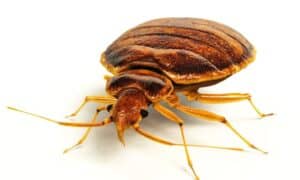Article by Ariane Triebswetter
Bedbugs. Who doesn’t fear them? But do you know what bedbugs are?
What are bedbugs
Bedbugs are small insects without wings, who drink the blood of warm-blooded animals, especially humans. They can reside anywhere but mostly live in furniture, textile, or bedding. Bedbugs usually feed when humans are asleep, on exposed areas, between midnight and five AM. They need to feed regularly, to be able to survive, reproduce and lay eggs.
Bedbugs are small creatures, usually ranging from four to five millimetres, so they are hard to notice. They can live up to a year without feeding. And they are exactly what could ruin your travels. Especially because if you get them, whether through a hotel, hostel, Airbnb, or whatever accommodation you prefer, you will likely bring them home.
They will remain or lay eggs on your clothes and luggage, so you really should throw your possessions away during this stay. Otherwise, bedbugs will infest your home and it will be difficult to get rid of them.
Packing
Before you leave for your destination, you can do some things to prevent having bedbugs at your stay and prevent you from throwing away your belongings.
Choose your accommodation carefully, read reviews online. Choose hard suitcases instead of soft ones, as it makes it easier to find bugs on a hard surface. If you can, wrap your suitcase in plastic, according to regulations.
Pack clothing that can be washed at high temperatures. Once you are at your destination, avoid putting clothes on the floor or the bed. And do wash your clothes at a high temperature when you come home.
Signs of bedbugs
So when you are staying somewhere abroad, here are some things you can do: put your suitcase in the bathroom, make sure to avoid the floors (especially if it is carpet), look at the bedsheets closely to see if there are any traces of blood or insect eggs, inspect both sides of the mattress, and whatever furniture is there.
There is often the assumption that bedbugs are only in dirty, cheap accommodations, but this isn’t true. In fact, bedbugs prefer clean environments, including five-star hotels, so be sure to always check where you are staying, and if any issues were reported in the past.
This hassle is worth it, to avoid a very unpleasant stay. If you see any signs of a possible infestation, immediately alert the reception or staff, ask to be refunded, and go somewhere else. Chances are if one room is infested, the others will be too.
To avoid this, check your accommodation on bedbugregistry.com, a website tracking the database of bedbugs through the USA and Canada.

What to do if bedbugs bite you
If you had the misfortune of being bitten, you should ask a pharmacist or a doctor what to do. Some bite marks will disappear on their own approximately after a week, but some people might have reactions to them.
These bites could be itchy, red, and there might be painful swelling. You could also get an allergic reaction, but they are rare. A pharmacist might recommend some mild steroid cream, or antibiotics, for allergic reactions.
These bites won’t induce any health problems, they are just itchy and unpleasant, which is enough to ruin your stay. They might give you secondary bacterial infection, if you scratch the marks, so avoid scratching them.
Traveling knowing you have bedbugs
Bedbugs spread. And you might still be carrying them when you leave an infested stay. If this is the case, go to the nearest laundromat and wash your clothes and shoes, at a high temperature and dry them on a high spin. If there is no laundromat nearby, seal your clothes in a plastic bag, until you can wash them.
Your travel insurance or credit card might cover the purchase of new luggage since you can’t treat infested luggage. Shower when you arrive at your new accommodation. And, of course, check for any bedbugs sign before.
Unpacking
When you come back from your trip, be careful not to infest your home, as bedbugs are highly resistant to removals.
Place your luggage outside, if you can. For example, on your balcony or garage. Wait a few days before bringing it back inside, if you want to make sure your house won’t be infested with bugs. Otherwise, you do unfortunately have to throw away your belongings.
Inspect your suitcase and bags before they are brought inside, and check for any signs of bedbugs. If you don’t see any signs, wash your clothes and dry them at a high temperature and clean and disinfect your other belongings. Be wary if you notice bite marks.
Getting rid of them in your home
If after all of this, bedbugs still find a way to creep into your home, you will have to find more radical methods.
Firstly, you can deep clean, use bug sprays, insecticides and aerosols. Be careful, you shouldn’t use them on your bed, for your health. Remove clutter, vacuum and clean your home regularly.
A pest control firm can help you determine if you can disinfect your mattress or if you need to throw it away. You should also inform your landlord and any other person you live with. You or your landlord should contact a pest control firm, who will determine the best solution for each case.
Conclusion
To sum it up, bedbugs are not fun. And if you can avoid them, you should. Nobody wants bedbugs, especially not when travelling. Be sure to check your stay by reading reviews and checking the history of bedbugs on specialized websites.
When you arrive, leave your luggage in the bathroom if you can, and check the sheets, mattress, and head frame first. Then you can check the furniture for signs. To be extra careful, don’t leave your belongings on the floor or the bed.
If you have bites (which can appear only after a week), go to a pharmacy. Don’t scratch.
Disinfect your belongings, and check twice before you go home.
If you follow all of these recommendations, you just have to make sure you enjoy your travels! Bedbugs free.
Safe Travels and Enjoy!!
**Please share this post. Thank you!!



0 Comments